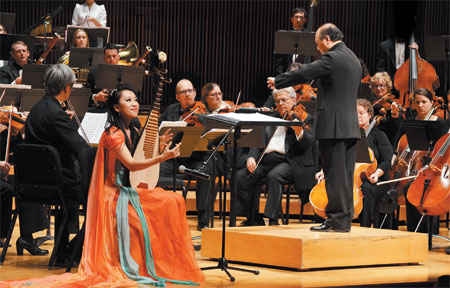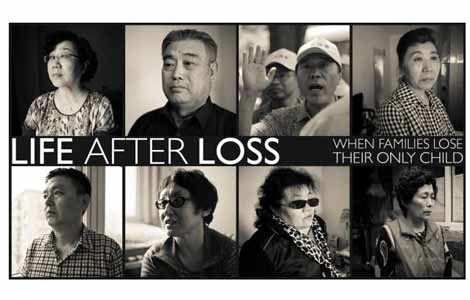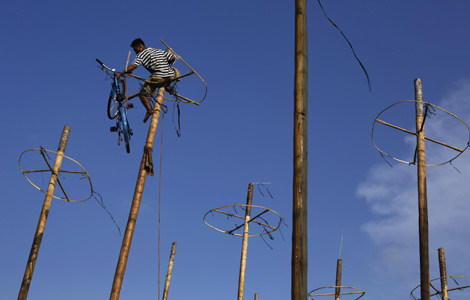Playing 'cool music' on suona and pipa
Updated: 2013-09-30 11:08
By Leng Shujie (China Daily)
|
||||||||
|
Pipa (Chinese lute) soloist Zhao Cong performs during a concert presented by the China National Orchestra and the Carolina International Orchestra with conductor He Jianguo. Cai Chunying / China Daily |
A curtain of tunes rises up, melodies flow, evoking images of the ancient Silk Road. The pace picks up, every instrument is involved in the rich tapestry of harmony and counterpoint. The performance ends, leaving a lingering charm in the air just before the applause.
Watching and listening to the debut of the newly adapted Silk Road, part of a musical experiment combining traditional Chinese instruments with a Western orchestra, some Americans in the audience couldn't help but be amazed.
"It has quite a touch of Hollywood," said Saul Sosnowski. "I'm delighted, because it picks up different tones from different cultures along the way."
In addition to Silk Road, 12 acclaimed traditional instrumental soloists from the China National Orchestra and more than 60 musicians from the Carolina International Orchestra performed another 11 Chinese musical compositions on Friday evening as part of Trans-Pacific Melodies - an East-meets-West concert - at the Clarice Smith Performing Arts Center at the University of Maryland.
"Chinese music has a long history, but few people in the West know about it," conductor He Jianguo said in a brief interview before the concert. "What we are performing today is all Chinese songs, performed by Chinese instruments, adapted by Chinese composers. We use the symphony orchestra as an accompaniment, but rewrite it for Chinese music. It's a new experiment."
For instance, Festival Overture by Chinese composer Shi Wanchun incorporates traditional wind instruments such as the suona, which is popular in the villages of northern China, with Western strings to create a sense of happiness in the beginning of the concert.
Lady Flower, a song adapted from Chinese popular music, was played on the bamboo flute and Chinese fiddle, or erhu, along with the orchestra.
Unlike Western music's emphasis on spectacular ensemble effects, Chinese classical music stresses imagery and the lasting appeal behind musical notes.
"Chinese music has its inner charm. It is very different from Western music, which has a very clear rhythm," said Zhao Cong, a four-stringed pipa, or Chinese lute, master, who also performed.
Rehearsing together for only two days before the concert, Zhao said that in spite of a few communication problems, the two orchestras worked well together and the progress was outstanding.
"I think this collaboration gives them an entirely new experience that our music is not as old as they expected," said Zhao, during a break at a rehearsal. "What makes this concert different is that [it makes us realize] that music is a mutual languagewe are trying to find it."
Established in 2012 by Yang Xi, a Chinese American violinist, the Carolina International orchestra has musicians from orchestras all over the southeastern US, including bassoonist Michael Majors and violinist Abby Van Steenhuyse.
Majors, a soldier in the US Army who plays bassoon in the army band, said he took leave from the military to play at this Chinese concert. Influenced by his twin brother, who lives in China and is a big fan of Chinese culture, Majors said he hadn't expected to see so many Chinese instruments.
"It was a nice surprise, for sure, to see all the classical traditional instruments in China, and we get to play some cool music on them. That's fun," said Majors.
Abbey Van Steenhuyse cancelled her private violin lessons in North Carolina to join the orchestra, because she "thought it was that important", she said.
Given the short time for rehearsal, Van Steenhuyse said, the hardest part was striking the right balance between the two types of music.
"Making sure that we are really accompanying them, not stuck in our music, because it's kind of new," she said. "But it's such an exciting opportunity. You aren't going to pass it up because it's a little rough around edges."
The concert, organized by the Chinese Ministry of Culture and hosted by the Carolina China Council, the Confucius Institute at the University of Maryland and the Agis Center for Arts and Humanities with sponsorship from Goldman Sachs, will be followed by another three performances in North Carolina this October.
For China Daily
(China Daily USA 09/30/2013 page10)
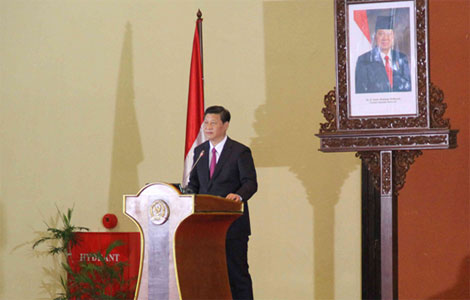
 President Xi gives speech to Indonesia's parliament
President Xi gives speech to Indonesia's parliament
 268 fishermen trapped by Typhoon Wutip saved
268 fishermen trapped by Typhoon Wutip saved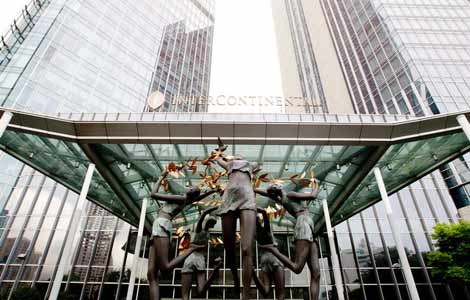
 Little room for growth among high-end hotels
Little room for growth among high-end hotels
 Diplomatic game
Diplomatic game
 The first place to be called the 'Middle Kingdom'
The first place to be called the 'Middle Kingdom'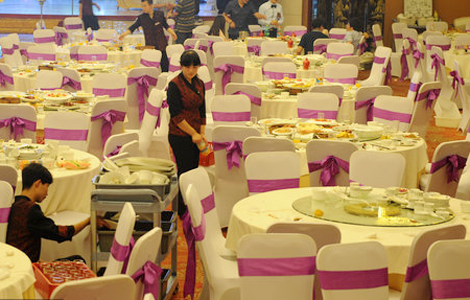
 Lavish wedding ebbs under luxury ban
Lavish wedding ebbs under luxury ban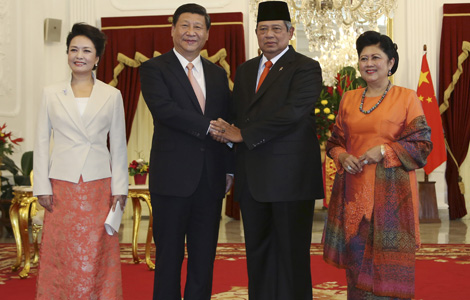
 Xi pledges to boost ties with Indonesia
Xi pledges to boost ties with Indonesia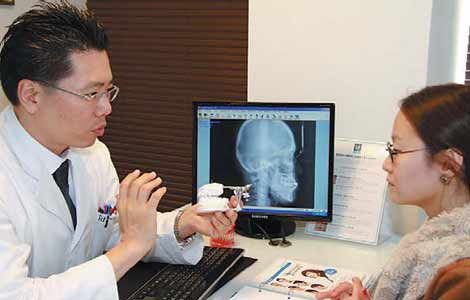
 Travel becomes passport to a new look
Travel becomes passport to a new look
Most Viewed
Editor's Picks

|

|

|

|

|

|
Today's Top News
Obama, congressional leaders still deadlocked
A community of common destiny
Russian embassy in Tripoli attacked
Iran has proposal for nuclear deal
Trending news across China
The luxury of travel
US novelist Tom Clancy dies at 66
China, Indonesia renew currency swap deal
US Weekly

|

|
